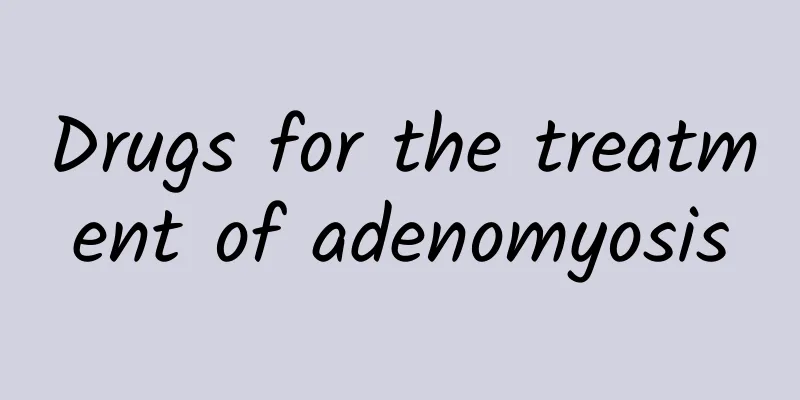Drugs for the treatment of adenomyosis

|
The treatment of adenomyosis mainly includes analgesics, hormone drugs and gonadotropin-releasing hormone agonists, with the aim of relieving pain, controlling the disease and improving the patient's quality of life. Each drug has different indications and effects, and needs to be selected under the guidance of a doctor. 1) Pain medication For mild to moderate pain, nonsteroidal anti-inflammatory drugs (NSAIDs), such as ibuprofen and celecoxib, are commonly used. These drugs can relieve menstrual pain and chronic pelvic pain. When using them, pay attention to the dosage, take them according to the doctor's instructions, and avoid long-term use to prevent gastrointestinal irritation. 2) Hormone drugs Hormonal therapy mainly works by reducing estrogen levels to inhibit the growth of the endometrium. Commonly used drugs include: - Progestogen drugs: Dienogest is a commonly used choice, which relieves symptoms by inhibiting endometrial hyperplasia. It may cause reduced menstrual flow or amenorrhea when taken, but the effect is significant. -Combined oral contraceptive pills: Suitable for patients with milder conditions, they can regulate hormone levels every month and relieve dysmenorrhea and excessive menstrual bleeding. -Levonorgestrel intrauterine device (IUD): Local release of hormones, effective pain relief, suitable for patients who need long-term contraception. 3) Gonadotropin-releasing hormone (GnRH) agonists This type of drug (such as leuprolide) reduces hormone levels by inhibiting ovarian function, simulating a "pseudo-menopause" state to improve adenomyosis, but its side effects include temporary menopausal symptoms such as bone loss and hot flashes. It is generally not used for more than 6 months, and is often combined with "add-on therapy" to reduce side effects. Precautions and medication selection Patients need to choose appropriate medications based on the severity of their condition, age, and fertility plans. If symptoms are mild, painkillers or hormone drugs can be used; for severe patients or those with poor drug tolerance, other treatments (such as surgery) should be considered. Drug treatment for adenomyosis requires an individualized plan. If symptoms are severe or medication is ineffective, you should actively communicate with your doctor to adjust your treatment strategy, such as considering further intervention measures such as surgery. Do not stop or use medication without authorization. |
<<: What are the symptoms of adenomyosis and adenomyoma?
>>: What diseases can thick endometrium cause?
Recommend
Can Bartholinitis be cured in one go?
The effect of surgical treatment of diseases is q...
Patients with dysmenorrhea must know some conditioning methods
According to a survey, almost half of women will ...
What should I do if I have bleeding and lower abdominal pain many years after menopause?
What should I do if I have bleeding and lower abd...
Tips: How should pregnant women treat severe cervical erosion?
As a serious gynecological disease, severe cervic...
Is cervicitis a disease? Is it contagious?
Cervicitis is not a disease, but it is a gynecolo...
7 Diet Traps to Watch Out for When Eating Out and Want to Lose Weight
Many people must have encountered this kind of tr...
How to distinguish between miscarriage and menstruation? Judging from the four types of miscarriage
1. Distinguish between miscarriage and menstruati...
Patients with ovarian cysts should pay attention to their symptoms in time
In recent years, with the increasing incidence of...
Doing weight training frequently, but your abdominal muscles are still not showing any signs of growth? Nutritionists reveal the three main culprits
Showing off wealth is out of fashion. Now it’s co...
What is hyperprolactinemia?
What is hyperprolactinemia? Hyperprolactinemia is...
What are the nursing issues for adnexitis?
Adnexitis is one of the diseases that everyone is...
Radish diet can effectively relieve vaginitis symptoms
In addition to actively cooperating with clinical...
What are the clinical characteristics of primary dysmenorrhea?
Primary dysmenorrhea is a type of dysmenorrhea. T...
Nonspecific vaginitis will continue to spread if it is not treated for a long time
Since the occurrence of nonspecific vaginitis is ...
Say goodbye to the annoying belly~ 3 exercises of crunches and leg lifts are super effective
You sit for 7 or 8 hours at work every day. Not o...









